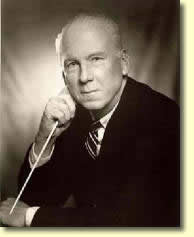
Leroy Anderson
Born: 1908Died: 1975
Education: self-taught
Career: composer
Leroy Anderson (June 29, 1908 – May 18, 1975) was an American composer of short, light concert pieces, many of which were introduced by the Boston Pops Orchestra under the direction of Arthur Fiedler. John Williams described him as "one of the great American masters of light orchestral music Born in Cambridge, Massachusetts to Swedish parents, Anderson was given his first piano lessons by his mother, who was a church organist. He continued studying piano at the New England Conservatory of Music. In 1925 Anderson entered Harvard University, where he studied theory with Walter Spalding, counterpoint with Edward Ballantine, harmony with George Enescu, composition with Walter Piston and double bass with Gaston Dufresne. He also studied organ with Henry Gideon. He graduated with a Bachelor of Arts degree in 1929 and Master of Arts in 1930. Anderson continued studying at Harvard, working towards a PhD in German and Scandinavian languages. (Anderson spoke English and Swedish during his youth but he eventually became fluent in Danish, Norwegian, Icelandic, German, French, Italian, and Portuguese.) During this time he was also working as organist and choir director at the East Milton Congregational Church, leading the Harvard University Band, and conducting and arranging for dance bands around Boston. His arranging work came to the attention of Arthur Fiedler in 1936 and Anderson was asked to show Fiedler any original compositions. Anderson's first work was Jazz Pizzicato in 1938. Fiedler suggested that a companion piece be written and thus Anderson wrote Jazz Legato in 1938. In 1942 Leroy Anderson joined the U.S. Army, and was assigned to Iceland as a translator and interpreter. Later in 1945 he was assigned to the Pentagon as Chief of the Scandinavian Desk of Military Intelligence. But his duties did not prevent him from composing, and in 1945 he wrote "The Syncopated Clock" and "Promenade". Anderson was a reserve officer and was recalled to active duty for the Korean War. In 1951 Anderson wrote his first hit, "Blue Tango", earning a Golden Disc and the No. 1 spot on the Billboard charts. His pieces and his recordings during the fifties conducting a studio orchestra were immense commercial successes. "Blue Tango" was the first instrumental recording ever to sell one million copies. His most famous pieces are probably "Sleigh Ride" and "The Syncopated Clock", both of which are instantly recognizable to millions of people. In 1950, WCBS-TV in New York City selected "Syncopated Clock" as the theme song for The Late Show, the WCBS late-night movie. Mitchell Parish added words to "Syncopated Clock", and later wrote lyrics for other Anderson tunes, including "Sleigh Ride", which was not written as a Christmas piece, but as a work that describes a winter event. Anderson started the work during a heat wave in August 1946. The Boston Pops' recording of it was the first pure orchestral piece to reach No. 1 on the Billboard Pop Music chart. From 1952 to 1961, Anderson's composition "Plink, Plank, Plunk!" was used as the theme for the CBS panel show I've Got A Secret. Anderson's musical style, heavily influenced by George Gershwin and folk music of various lands, employs creative instrumental effects and occasionally makes use of sound-generating items such as typewriters and sandpaper. (Krzysztof Penderecki also uses a typewriter in his orchestral music, in "Fluorescences", but with a decidedly less humorous effect.) Anderson wrote his Piano Concerto in C in 1953 but withdrew it, feeling that it had weak spots. In 1988 the Anderson family decided to publish the work. Erich Kunzel and the Cincinnati Pops Orchestra released the first recording of this work; three other recordings have since been released. It is a conservative Romantic work in sonata form, heavily influenced by Rachmaninoff and American popular music, and somewhat resembles Copland's tonal works in style. In 1958, Anderson composed the music for the Broadway show Goldilocks with orchestrations by Philip J. Lang. Even though it earned two Tony awards, Goldilocks did not achieve commercial success. Anderson never wrote another musical, preferring instead to continue writing orchestral miniatures. His pieces, including "The Typewriter", "Bugler's Holiday", and "A Trumpeter's Lullaby" are performed by orchestras and bands ranging from school groups to professional organizations. Anderson would occasionally appear on the Boston Pops regular concerts on PBS to conduct his own music while Fiedler would sit on the sidelines. For "The Typewriter" Fiedler would don a green eyeshade, roll up his sleeves, and mime working on an old typewriter while the orchestra played. Anderson was initiated as an honorary member of the Gamma Omicron chapter of Phi Mu Alpha Sinfonia at Indiana State University in 1969. In 1975, Anderson died of cancer in Woodbury, Connecticut and was buried there. For his contribution to the recording industry, Leroy Anderson has a star on the Hollywood Walk of Fame at 1620 Vine Street. He was posthumously inducted into the Songwriters Hall of Fame in 1988 and his music continues to be a staple of "pops" orchestra repertoire. In 1995 the Harvard University Band's new headquarters was named the Anderson Band Center in honor of Leroy Anderson. In 2006, one of his piano works, "Forgotten Dreams", written in 1954, became the background for a British TV advertisement for mobile phone company '3'. Previously, Los Angeles station KABC-TV used the song as its sign-off theme at the end of broadcast days in the 1980s, and Mantovani's recording of the song had been the closing theme for WABC-TV's "Eyewitness News" for much of the 1970s. The Typewriter was used as the theme song for Esto no tiene nombre, a Puerto Rican television comedy program -loosely based on the US television series Rowan & Martin's Laugh-In- produced by Tommy Muniz between the late 1960s and late 1970s. His first name was pronounced the classical way, with the stress on the second syllable; "Luh-ROY" rather than the now prevalent pronunciation of that name, "LEE-roy".

